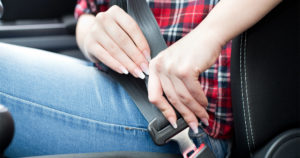The NHTSA’s Summer Driving Tips
July 28, 2020 Although things may be looking a bit different this summer, there are still plenty of people on the nation’s roadways or with plans to travel. The roads can be particularly deadly during hotter months. Just two years ago, more than 9,000 individuals were fatally injured in motor vehicle accidents that occurred between June and August. Last year, 52 children died from complications associated with vehicular heatstroke after being left unattended in hot vehicles.
Although things may be looking a bit different this summer, there are still plenty of people on the nation’s roadways or with plans to travel. The roads can be particularly deadly during hotter months. Just two years ago, more than 9,000 individuals were fatally injured in motor vehicle accidents that occurred between June and August. Last year, 52 children died from complications associated with vehicular heatstroke after being left unattended in hot vehicles.
The majority of nonfatal and fatal car accidents are preventable, but only by taking certain precautions. The National Highway Transportation Safety Administration (NHTSA) created its summer safety checklist for this very reason. Take a look below to read more about the agency’s lifesaving tips.
Safety Tips for Kids
A child’s body temperature rises three to five times faster than that of an adult, and even in cooler weather the temperature inside of a vehicle can become deadly quite quickly. For these reasons, it is critical to never leave a child unattended in a parked vehicle (even if the motor is running or if you opened windows) for any period of time. It is also essential to take steps to ensure that a child is unable to gain unsupervised access to a vehicle.
We are all prone to becoming accustomed to our daily routines, but there are steps we can take to make sure that a simple mistake does not turn into a tragic and deadly one. The American Academy of Pediatrics (AAP) recommends that parents and caregivers observe the following safety tips to limit cases of vehicular heatstroke in children:
- Avoid all distractions while driving. Distractions include anything from using your cell phone to fiddling with your GPS or eating while behind the wheel
- Store car keys out of reach of children
- Always lock your vehicle when it is in park
- Teach children that cars – and trunks – are not safe or appropriate areas to play in
Luckily, there are also plenty of products out there that are trying to tackle this issue head on. Some car alarms will notify the user on their cell phone if they detect movement inside the vehicle. There are also a variety of car seats that alert someone if their child was left in the seat and in some cases, even send alerts if a child’s body temperature is becoming dangerously high or low. And remember: every time you exit your vehicle be sure to check the backseat before locking the doors.
Travel Checklist
The NHTSA recommends checking a vehicle for posted recalls in addition to making sure it is up to date on regular service (e.g. tire rotations, tune-ups, oil changes, and battery checks) before taking a trip. It is also important to stock the vehicle with an emergency roadside kit, just in case there is a flat tire or the car breaks down. According to the NHTSA, emergency roadside kits should contain the following contents:
- Cell phone and charger
- Flashlight
- First aid kit
- Flares and a white flag
- Jumper cables
- Jack (and ground mat) for changing a tire and a tire pressure gauge
- Nonperishable food, drinking water, and necessary medications
- Extra windshield washer fluid
- Emergency blankets, towels, and coats
- Maps
Having a cell phone should be a top priority, since it will allow you to call for help if you need to.
Other Ways to Prevent Accidents
The NHTSA says there are a few other steps everyone can take to decrease the likelihood of a dangerous or deadly accident from happening. Make sure to buckle up every single time you are in your (or anyone else’s) vehicle. Ensure that all passengers buckle up or are secure in age-appropriate seat belts, booster seats, or car seats as well (for example, children under 13-years-old should always sit and buckle up in the back seat).
Tires are another important, though often forgotten, component of roadside safety. In 2017 for example, 738 people died in tire-related vehicular crashes. Inspect your tires at least once a month and before you take a long trip. Be sure to check the spare tire as well. One way to see whether you need new tires or not is to inspect the tread. If the tread is uneven or insufficient, it is time to replace the tire. Some tire manufacturers recommend replacing tires every six years no matter how much (or little) you used them; you can check your vehicle’s owner manual to find out more.
Our team at Galfand Berger wants to remind our readers and their families to stay safe (but also to enjoy!) this summer. If you have a legal question or concern about injuries you or loved one sustained in an automobile accident, someone at our firm can help. Contact a representative online now.
Philadelphia Personal Injury Lawyers at Galfand Berger, LLP Representing Injured Individuals Since 1947
With offices located in Philadelphia, Bethlehem, Lancaster, and Reading, we serve clients throughout Pennsylvania and New Jersey. To schedule a consultation, call us at 800-222-8792 or complete our online contact form.
 Google Screened
Google Screened
